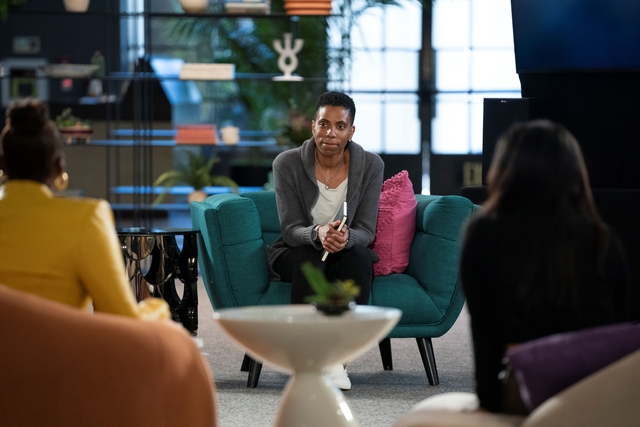“The films of Project Greenlight past have been OK,” Issa Rae tells a Project Greenlight camera, with a dubious expression that suggests they would not have passed muster with her. “So we wanna make sure that ours is actually a great film.” As a creator whose stellar track record includes shows like Insecure and Rap Sh!t, Rae—who helms Max’s revival of the 22-year-old series that follows a first-time feature director’s journey from script to premiere—has earned the right to have exacting standards. But when it comes to Greenlight, she’s being generous.
The truth is that, in the four seasons that aired between 2001 and 2015, on HBO and Bravo, the show failed to produce even one movie likely to earn tepid praise on the film-festival circuit. It’s easy to blame this track record on the original Greenlight team, which featured Good Will Hunting wonder twins Matt Damon and Ben Affleck as executive producers and on-camera mentors, in partnership with Weinstein-era Miramax. In season 4, Damon notoriously exacerbated a tense situation by dismissing the concerns a Black, female producer, Effie Brown, raised about the production’s lack of diversity. This central conflict yielded an unwatchable film (The Leisure Class) but a compelling and frustrating season of nonfiction TV that presaged Hollywood’s biggest controversies of the last decade, from Time’s Up to #OscarsSoWhite.
It makes sense that Max (referred to, throughout a season completed before the Warner streaming service’s big rebrand, as HBO Max) would entrust Rae and her production company, Hoorae, with the task of updating the series for the culture-war 2020s in a way that would not inadvertently humiliate its many stakeholders. The resulting stylized sci-fi drama, Gray Matter, which is also streaming on Max, is neither a triumph nor an embarrassment; as Rae eventually notes, that makes it easily the best feature Greenlight has ever produced. What’s more important is the process. If you have the patience for a lower-key chronicle of the gestation of a film and the education of a filmmaker in the age of straight-to-streaming genre fare, the rebooted Project Greenlight: A New Generation makes for a fascinating watch on its own merits.

Like its predecessors, A New Generation begins with a talent search. But this time around, the rules are a bit different. “We’re choosing a woman director,” Rae explains in a rightfully shady intro, “because Project Greenlight has never had one before.” Along with two other well-chosen mentors—Kumail Nanjiani and veteran auteur Gina Prince-Bythewood (The Woman King, Love & Basketball)—and a small army of executives representing Hoorae, Warner, CatchLight Studios, and 3 Arts Entertainment, Rae narrows the pool of short-film submissions to 10 finalists, who each get to shoot their version of a scene from the Gray Matter script. The best take comes from a relative underdog: LA-based director, writer, and trailer editor Meko Winbush.
Taciturn, with a wry sense of humor, Meko couldn’t be more different from the standard exhibitionist reality star. Her muted responses to feedback emerge as one of the season’s earliest issues. And while it’s frustrating to watch her shrug off thoughtful script notes that would’ve helped the final product immensely, it isn’t always clear that her self-contained personality is as big a problem for the making of Gray Matter as it is for Greenlight. (On set, she radiates quiet authority with her crew and seems to form mutually trusting bonds with her cast.) As in past seasons, the needs of the series conflict with the needs of the movie. The challenge for Meko and her team isn’t just to make her first feature; it’s to do so surrounded by a camera crew and nosy producers, as fodder for a TV show that’s sure to magnify their worst moments.
It would take a performer of Rae’s or Nanjiani’s charisma to bend such a task into a compelling personal origin story, and it isn’t necessarily a real-world problem that being Greenlight’s main character is not Meko’s priority. The series’ real draw has always been its behind-the-scenes account of how the average, non-blockbuster movie gets made. In the 2000s, that meant an Indiewood landscape where Miramax loomed large. A New Generation might as well be set in a different universe, where media monoliths like Warner Bros. Discovery have vertically integrated each step of the process, obviating the need for a theatrical release, and everything is content. Chemistry reads happen on Zoom. The effects-heavy shoot is allotted just 18 days.

At the same time, the number of stakeholders in a film like Gray Matter have multiplied. For the veteran producers of CatchLight, charged with managing logistics and keeping the shoot within its tiny-for-sci-fi $3.5 million budget, the priority is simply to make sure a movie gets made. A level removed from that struggle, the Warner execs are all smiles on camera but heavy-handed when it comes to big decisions like casting the leads. Hoorae—a powerful force in an industry where celebrity-helmed production companies have proliferated—cannily casts itself, and thus Rae, as a voice for artistic integrity and inclusive hiring. As a working director, “you’re gonna be a walking economy,” one exec tells Meko. “We gotta do the pipeline work.” (Since Greenlight is their project, it may not be a coincidence that this telegenic team can seem like the show’s true protagonists.) Everyone has notes, and these voices of experience don’t always agree.
It’s a credit to Hoorae and to Greenlight that these conflicts feel authentic. A less ingenuous account of a Black, female filmmaker’s debut feature—and a less ingenuous effort to redress the controversies and oversights of the original Greenlight—might’ve hyped up that director at the expense of minimizing the near-impossible challenges she faces. Instead, the show mostly does justice to the difficulty of a task that Meko ultimately tackles with more success than any of her predecessors. “You’re a director,” her most devoted mentor, Prince-Bythewood, pronounces after screening an early cut. But amid the noise and austerity of Hollywood in 2023, it’s a wonder that even the savviest, most skilled directors manage to make good films.
More Must-Reads from TIME
- Donald Trump Is TIME's 2024 Person of the Year
- Why We Chose Trump as Person of the Year
- Is Intermittent Fasting Good or Bad for You?
- The 100 Must-Read Books of 2024
- The 20 Best Christmas TV Episodes
- Column: If Optimism Feels Ridiculous Now, Try Hope
- The Future of Climate Action Is Trade Policy
- Merle Bombardieri Is Helping People Make the Baby Decision
Contact us at letters@time.com